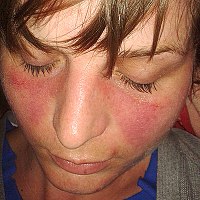
Photo from wikipedia
Hydroxychloroquine is widely used for autoimmune diseases such as systemic lupus erythematosus and rheumatoid arthritis. Although B cells contribute to the pathogenesis of these diseases, the action of hydroxychloroquine on… Click to show full abstract
Hydroxychloroquine is widely used for autoimmune diseases such as systemic lupus erythematosus and rheumatoid arthritis. Although B cells contribute to the pathogenesis of these diseases, the action of hydroxychloroquine on B cells remains unclear. Here we examined the effects of hydroxychloroquine on functions of B cell subsets. Hydroxychloroquine efficiently inhibited the mammalian target of rapamycin complex 1, differentiation of CD19+IgD-CD27+ class-switched memory B cells to plasmablasts and their IgG production, under stimulation with CpG, a Toll-like receptor (TLR)-9 ligand. Hydroxychloroquine also inhibited CpG-induced production of interleukin-6 and tumor necrosis factor-α in B cell subsets. Taken together, hydroxychloroquine markedly suppresses the TLR9-mediated human B cell functions during inflammatory processes. Based on our results, we believe that hydroxychloroquine can be beneficial in the treatment of B cell-mediated autoimmune diseases.
Journal Title: Clinical immunology
Year Published: 2018
Link to full text (if available)
Share on Social Media: Sign Up to like & get
recommendations!